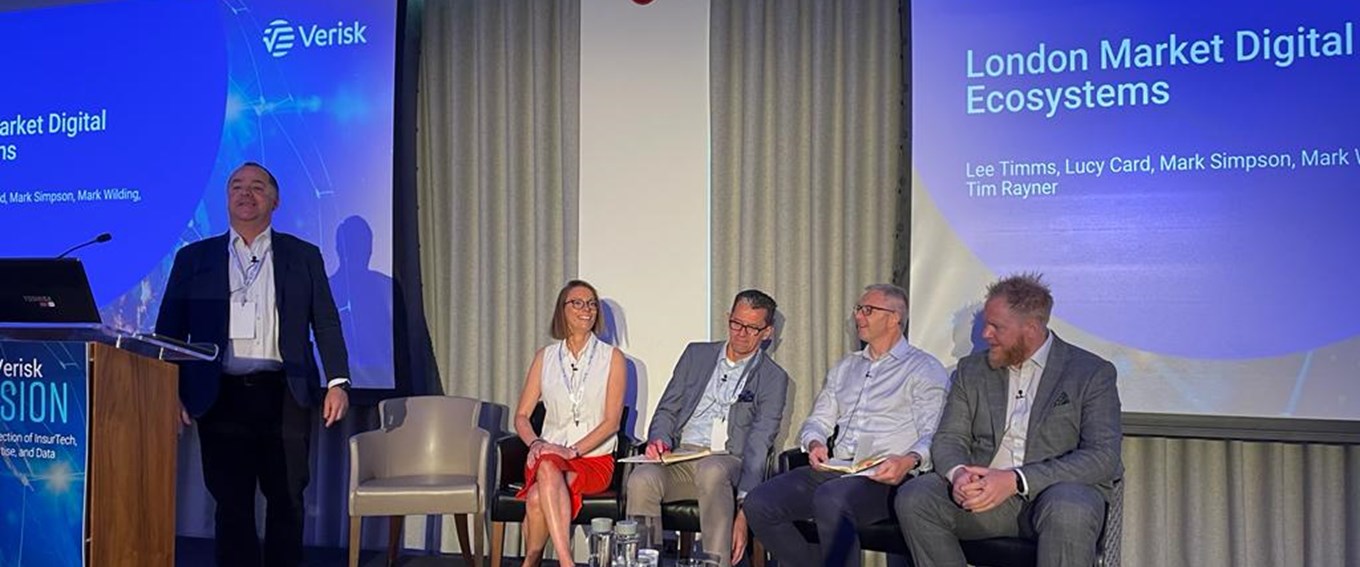London’s move to digital ecosystem needs to engage all
Blog -- 19 July 2022
Author: Marketing

Leading experts from the London market joined chair Tim Rayner CEO at Verisk Specialty Business Solutions at a session at the Verisk Vision 2022 conference to examine how London can move from an analogue to digital eco system. In a lively session they discussed a wide range of issues that will need to be overcome if the London market is to successfully transition operations to a digitalised future.
However, the panel agreed any efforts to bring the market along as a whole would be doomed to frustration and eventual failure. Instead, those driving change have to provide a range of points in the journey at which others in the market could join.
Mark Wilding, Digital Product Owner at Liberty Specialty Markets, said ‘there is considerable tech debt and legacy systems in the market which will inevitably lead to companies joining at different points in time’. Market history has left many with the ‘today’s cutting edge tech is tomorrows tech debt’ viewpoint. The fact is you can’t implement everything, it’s about how you manage your tech stack and the total cost of ownership.’
Lee Timms Programme Director at Howden Insurance Brokers said the key to success will be the delivery of structured data.
“For me structured data is so important,” he explained. “Brokers need to provide structured data. We need to use structured data to deliver much more value to the underwriter and we can then provide greater value to our clients. That structured data should be there from the outset, without it the fundamentals are not really in place.”
Lucy Card, Head of Client Engagement at Whitespace, said the issue remains that it does not matter how amazing the product you deliver was and what it could do if there was no willingness to use it.
“If it is not a slick customer experience then it all falls apart,” she added. “People in the market are realising that they need to use technology better in order to keep up with the rest of the financial services industry.”
Independent consultant Mark Simpson said it was often easy to lose sight of the fact that insurance was very much about the customer, capital and the experience of managing risk and this could not get lost in the drive for change.
“All too often the changes we have seen in the past have simply created a faster caterpillar,” he explained. “It is simply bottling your pain or your customer’s pain into a new container. This market is dynamic and if we are to succeed, we need to support change in a fluid way.”
Card added that those driving the change needed to understand legacy was not simply down to systems. “You have to allow for the legacy dynamic, which is not only systems, it can be cultural and around the need for learning,” she explained. “People are still very attached to documents. The word document is still floating around as much as the words ‘data’ and ‘digital’. To get users on a journey we need to be flexible.” That flexibility will require users and change managers to be involved from the outset rather than simply at the presentation of the finished system.
While the agreement between the big three brokers in the London market on a way forward around standards was seen as a huge achievement, the panel said the disparity in terms of the roles and sizes of the business across the market meant that the days of moving at the pace of the slowest was no longer acceptable if change was to occur.
“We need to help people understand what is real and what is possible,” said Simpson. “We see initiatives move at the pace of the slowest too often.”
Instead, the panel believed the message had to be that the journey would begin and it would move at pace, with those who had a digital strategy and were engaged, with those who were more reluctant invited to join as and when they felt they were ready.
“We need to understand our clients’ needs and bring them into the build cycle rather than simply present the solution when it is finished,” added Timms.
Mark Wilding explained: “Structured data can help us progress, but simply having it is only one aspect; we have to be clear as to what data is meaningful, and surface it in an integrated manner in a timely fashion to deliver meaningful value.
“How we ingest, filter and present data in a connected way is as important here”
Simpson said the likely future would be a series of ecosystems across the international markets in which companies will participate where, as and when they are required to transact business. “As an example, at present everyone is talking about the metaverse,” he explained. “There will be metaverses, and there will be a battle for attention; insurance markets are no different”
“It will be about agility and different entry points. We will need to look outside the industry to see how other sectors are connecting.”
Read Next
- 28 February 2025 - Blog A new era of Underwriting: Addressing Market Needs to Succeed
- 28 November 2024 - Blog What's your actuarial personality type?
- 08 November 2024 - Blog Data driven insight can be a game changer: the actuarial function in service of underwriting decision-making
- 30 October 2024 - Blog Rulebook Facts